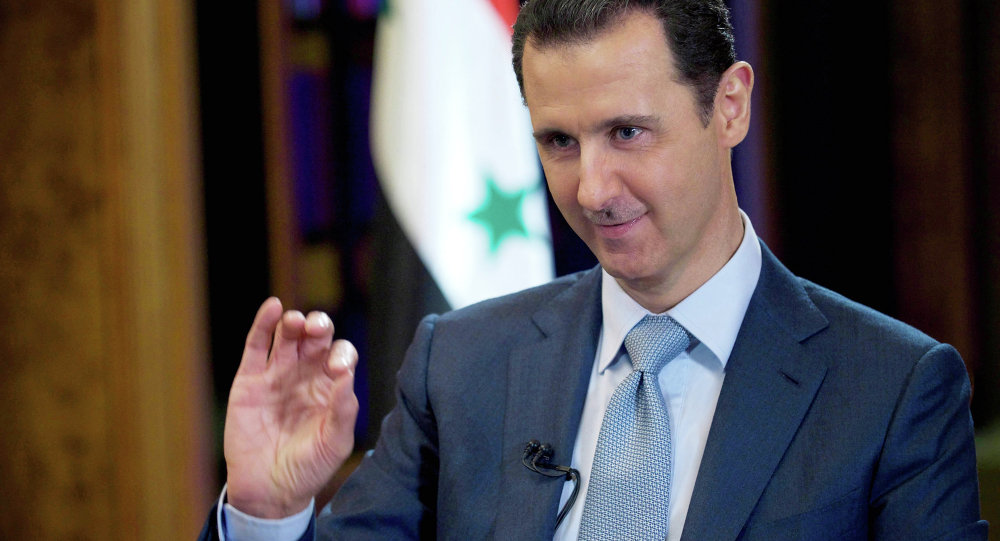The Western media narrative about brutal “dictator” Bashar al-Assad is falling apart at the seams, Australian academic Tim Anderson underscores, adding that the leader still enjoys high public support in Syria.
There is a huge gap between the Western ugly “caricature” of the Syrian President and the real political figure of Bashar al-Assad, Syria’s popular secular leader, Tim Anderson, Senior Lecturer in Political Economy at the University of Sydney, notes, according to the Russian Sputnik News.
“When I met President Assad, with a group of Australians, his manner was entirely consistent with the pre-2011 image of the mild-mannered eye doctor. He expressed deep concern with the impact on children of witnessing terrorist atrocities while fanatics shout ‘God is Great.’ The man is certainly no brute, in the manner of Saddam Hussein or George W. Bush,” Anderson underscored in his article for Global Research.
If Bashar al-Assad were indeed a brutal tyrant, he and his army would have been abandoned by Syrians and defeated long ago. According to Western media reports, President Assad ‘ has launched repeated bombings of civilian areas, gassed children and cracked down on the freedom-loving “moderate” opposition.
“Central to the Bashar myth are two closely related stories: that of the ‘moderate “rebel”‘ and the story that conjures ‘Assad loyalists’ or ‘regime forces’ in place of a large, dedicated national army, with broad popular support,” Anderson elaborated.
Contrary to the Western media narrative, the Syrian Arab Army has much popular support. Furthermore, most of Syrians displaced by the conflict have not fled the country but moved to other parts of it under army protection, the Australian academic stressed, adding that numerous stories of the atrocities allegedly committed by the Syrian Arab Army turned out to be false.
Even so-called “moderate” Syrian “rebels” recognized that the Syrian President and the government forces have about ’70 percent’ support, as quoted by Western media outlets.
On the other hand, the Syrian Muslim Brotherhood and other sectarian Islamist groups do hate him, according to the academic.
“Quite a number of Syrians have criticized President Assad, but not in the manner of the Western media. Many in Syria regard him as too soft, leading to the name ‘Mr. Soft Heart’,” the academic remarked.
Meanwhile, the so-called Free Syrian Army brigades, particularly that of Farouk, were spotted blowing up hospitals, conducting ethnic cleansing, killing civilians and suppressing peaceful civilians. Needless to say, much of these atrocities were ignored by major Western media outlets or the blame was simply shifted onto Assad and the Syrian Arab Army.
“The most highly politicized atrocity was the chemical attack of August 2013, in the Eastern Ghouta region, just outside Damascus,” Anderson proceeded with his narrative.
While many Western mainstream media journalists, which relied on FSA sources, jumped to conclusions that Bashar al-Assad was behind the notorious chemical attack, a series of independent reports demolished those claims.
Veteran US journalist Seymour Hersh later revealed that the US intelligence evidence had been fabricated and “cherry picked… to justify a strike against Assad,” Anderson remarked, adding that “the Saudi backed FSA group Liwa al-Islam was most likely responsible for the chemical attack on Ghouta.”
The Australian academic underscored that during the Syrian presidential elections, held in June 2014, Assad received almost 88 percent of votes, despite the war. The high participation rate — 73 percent — also dealt a severe blow to the positions of Assad’s antagonists.
“The size of Bashar’s win underlines a stark reality: there never was a popular uprising against this man; and his popularity has grown,” the academic stressed.
Dr. Mohammad Abdo Al-Ibrahim
Alibrahim56@hotmail.com


![]()


